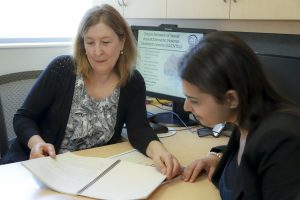Megan Saad helps develop training program to improve health care for transgender sexual assault survivors
August 28/2018
Megan Saad is helping to develop a training program to educate nurses on how to provide “trans-affirming” care to improve health services for trans persons who have experienced sexual violence.
“Trans people in their most critical time of need are often unable to access supports due to poor treatment from healthcare providers,” said Saad, a Collaborative Specialization in Women’s Health student entering her second year of DLSPH’s MPH (Health Promotion) program.
“It’s critical that we understand the barriers trans individuals face in accessing healthcare services and their heightened risk of violence as a result of transphobia,” said Saad, who hopes this specialized training will reduce the health inequities that trans people experience.
According to the Trans PULSE survey, a quarter of trans people seeking care at a hospital emergency department in Ontario have been ridiculed and one in five have avoided emergency departments because of previous discrimination or fear of experiencing discrimination. In a survey of frontline nurses working at Ontario’s 35 Sexual Assault/Domestic Violence Treatment Centres, 96 percent of the 95 respondents said that they could benefit from further training in the care of trans persons who have been sexually assaulted.
To address this need, Saad is working closely with her supervisor, Professor Janice Du Mont, a senior scientist at Women’s College Research Institute, in partnership with the Ontario Network of Sexual Assault/Domestic Violence Treatment Centres, Rainbow Health Ontario and a community advisory group to develop a curriculum and training for nurses working in hospital-based sexual assault/domestic violence care centres across Ontario.
“Healthcare providers haven’t paid enough attention to providing safe, appropriate, sensitive care to trans individuals who experience victimizations even though we know they’re at higher risk,” said Du Mont, who led the Sexual Assault/Domestic Violence Treatment Centre nurse survey this past year.
The overall purpose of the curriculum is to train healthcare providers in “trans-affirming care:” a model of care that recognizes, accounts for, and addresses the unique experiences of trans people.
“This approach is critical to help nurses provide care that is safe, sensitive and appropriately suited to trans clients’ needs, and it’s important that we engage individuals in trans communities who have the expertise to improve service delivery,” said Du Mont, who is also Director of the Collaborative Specialization in Women’s Health.
Du Mont and her research team, including Saad and fellow DLSPH student and PhD candidate in Social and Behavioural Health Sciences Hannah Kia, consulted with local trans community leaders and allies for feedback on the draft curriculum, which is based on evidence-informed competencies identified in earlier stages of the research. The research team translated these competencies into learning objectives for specialized sexual assault nurses.
Saad says that one critical aspect that the advisory group emphasized for the development of the trans-specific healthcare provider training was the importance of language because it’s a powerful tool that shapes how people choose to express themselves. It can also validate (or undermine) someone’s identity and life experiences.
“By training healthcare providers on the appropriate use of language and to reflect and mirror clients’ language preferences, providers acknowledge and respect clients’ right for quality care that takes into consideration their unique experiences,” said Saad.
The training pilot — including a comprehensive resource manual, a condensed presentation for training purposes and a facilitator’s guide to help trainers deliver key lessons — is rolling out in November at Ontario’s Sexual Assault Nurse Examiner Training. Saad and Kia will be supporting data collection for the pilot as well.
By engaging in this pilot and other research related to gender and health, Saad has gained a new understanding of how diverse the field of public health is.
“There’s a huge need for a critical focus on gender across the public health sector in order to reduce the persistent health gap that women have historically experienced and continue to experience today, including trans women, who often experience disproportionality high rates of sexual victimization due to transmisogyny: the combination of transphobia and misogyny,” said Saad.
Saad is one of approximately 35 students in the Collaborative Specialization in Women’s Health, a multidisciplinary learning experience that trains scholars across more than 13 disciplines to comprehensively examine women’s health and the various biological and social determinants that shape women’s lives and well-being. The specialization recognizes that the term “women” is itself a diverse category, emphasizing the unique experiences of all who identify as women, including trans women, bisexual women, racialized women and women living with disabilities.
“Women’s health issues are on the cutting edge of patient-centered care which is why I wanted to pursue this specialization. It allows me to connect theory to public health practice in very meaningful ways to improve the health of women across multiple axes of social identity,” said Saad.
Students who are interested in applying for the Collaborative Specialization in Women’s Health can find more information here.
To learn more about the initial development of the curriculum, watch this video.
Funding for this pilot was provided by the Women’s Xchange.
Photo courtesy of Women’s College Hospital.
